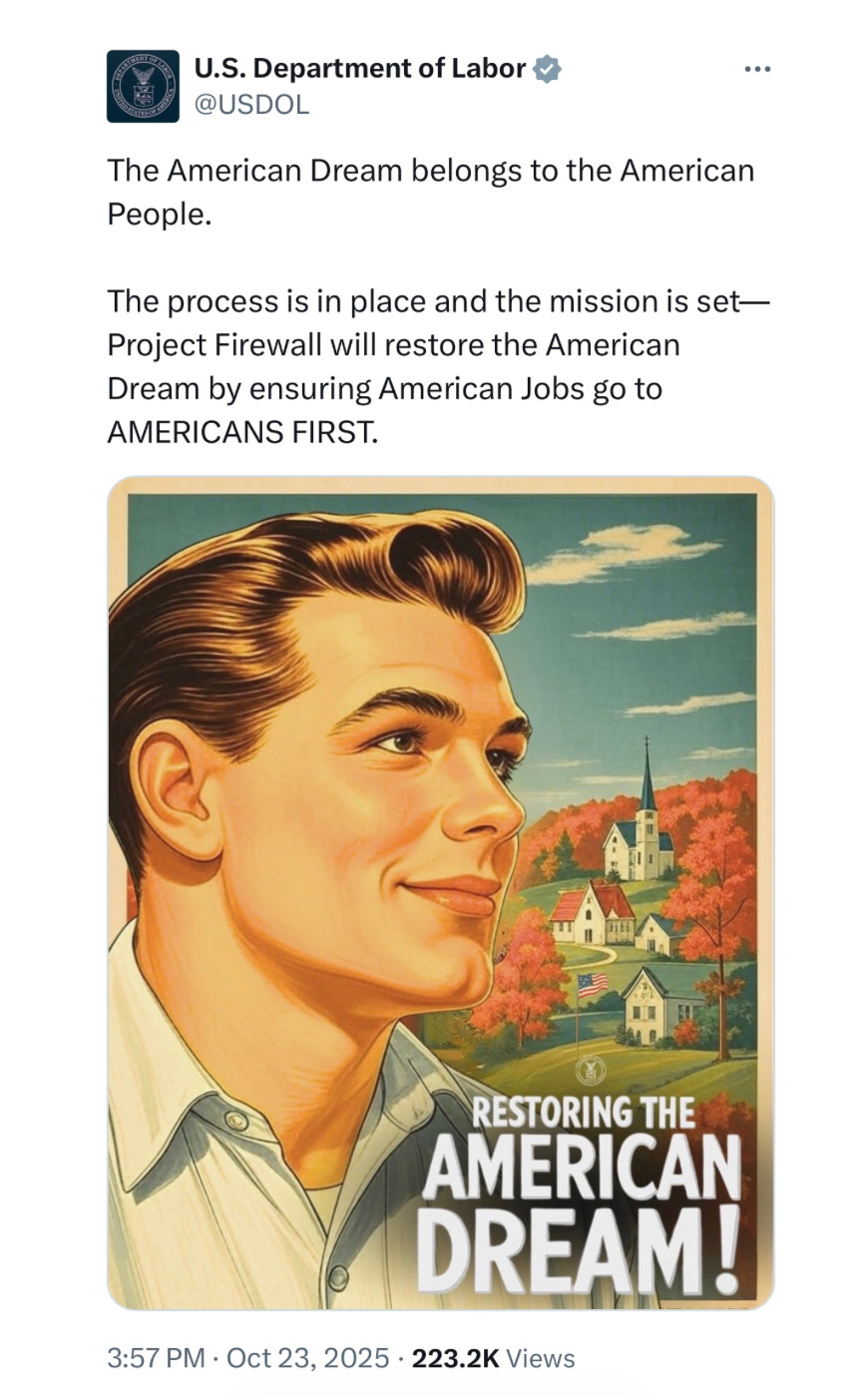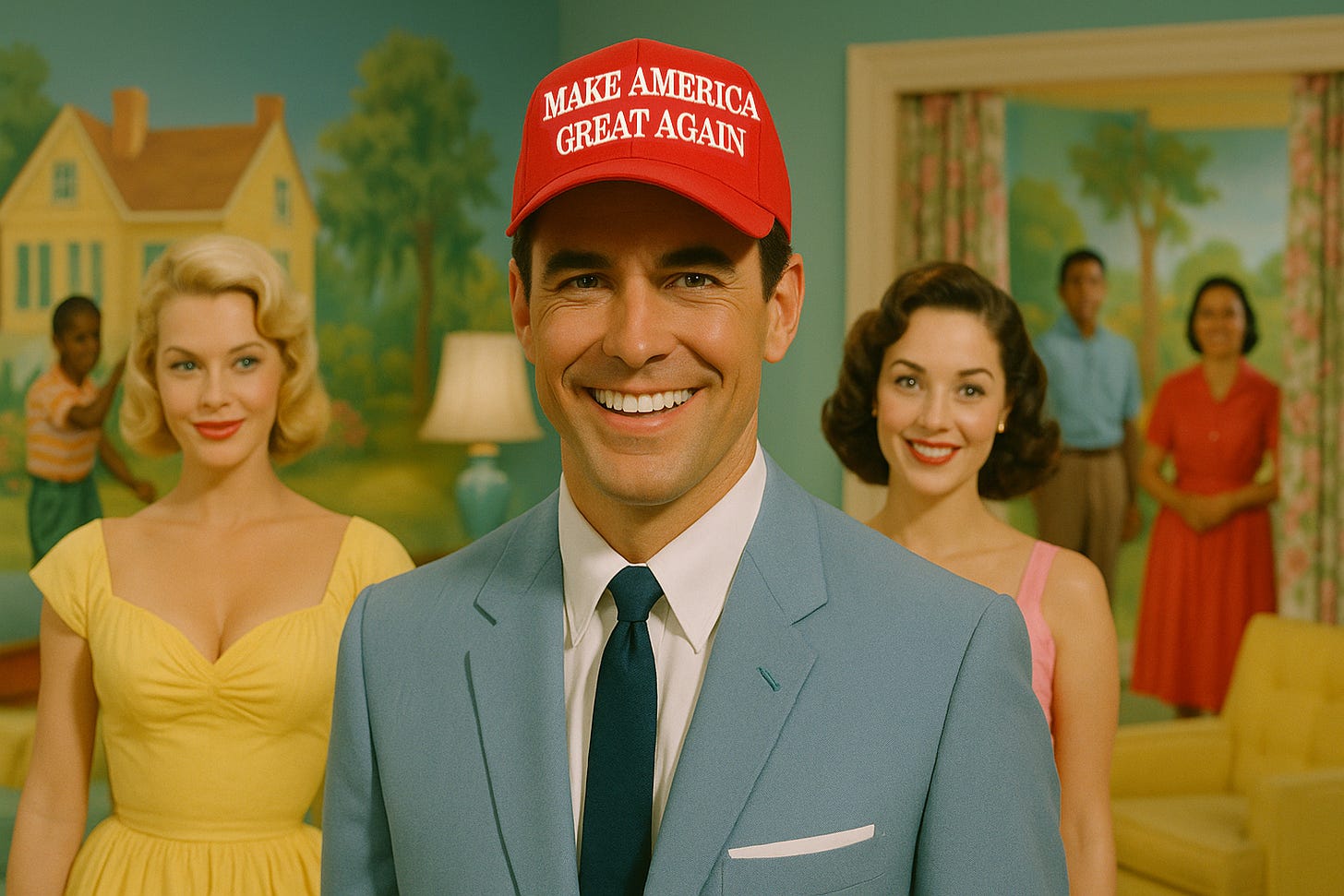The Consequential Role of Hollywood in the Rise of MAGA
It’s time for the tv and film industries to own up to their part in all this.
Editor’s Note: This version has been edited to remove a few behind-the-scenes writing notes that were accidentally published in the original post. My apologies if you came across that version—but I hope you enjoyed a little peek at how my brain works!
The Movie in Their Heads
When Donald Trump told America to “Make America Great Again,” it wasn’t the rallying cry for any sort of policy (as anything rarely is with the Cheeto-in-Chief). It was a beacon of nostalgia, not for real American history, but for an over-produced Hollywood rendering of it—another example of how we mistake narrative for truth, something I’ve written about here in the context of AI and human perception. The America MAGA longs for never really existed. It’s a composite of John Wayne westerns, black-and-white sitcoms, Norman Rockwell paintings, and Reagan-era blockbusters where white men were always the heroes, women were candy, and everyone else was scenery.
Trump didn’t invent this nostalgia. He inherited it from decades of storytelling that sold an idealized, whitewashed version of America as truth. The myth wasn’t born in Mar a Lago. It was born in Hollywood.
When Fiction Became the Foundation
Throughout the 20th century, film and television gave America its mirror… and its mask:
The Western turned violent colonization into moral conquest.
The 1950s suburban sitcom erased segregation and domestic abuse with a laugh track.
In 1990s COPS taught audiences to trust “good guys with guns” and that “black and brown people are violent criminals who deserve to be hunted, humiliated, and beaten.” I just learned that the reality show was cancelled after the murder of George Floyd in 2020 and quickly resurrected by Fox Nation.
Even “The Apprentice” itself, perhaps the most consequential piece of reality fiction of all, transformed a failing businessman into an archetype of capitalist genius.
While America’s flaws became punchlines, and its violence became valor, our collective and individual memory was rewritten. That’s because our human brains have a difficult time distinguishing fact and fiction in hindsight. We like to connect dots to make everything around us make sense, and we have a tendency to remember the past much rosier than it actually was.
That’s why a black-and-white vision of a simpler America feels true to so many people who never actually lived at that time. Movies and television don’t just reflect culture; they sculpt it at the neurological level, creating emotional muscle memory for and identities attached to moments that never happened. Movies and television painted a picture (which social media amplified), MAGA connected the dots, and we are living with the very real consequences.
The Architects of the Myth
Hollywood has always been controlled by a small class of mostly white men who determined what America looked like on screen (shocker) and, by extension, in the collective imagination. These gatekeepers weren’t necessarily conspiring to create MAGA ideology, but they were protecting & projecting their power and worldview.
By curating who got to be heroic, desirable, or civilized, they wrote a subconscious script for the nation: America is good and white people men are better, and you can see it with your own eyes. That narrative, repeated endlessly and visually, conditioned audiences to mistake it for truth, and a lot of white men to think they are righteous kings of the earth.
Watch Charles Barkley attempt to have constructive dialogue with a white supremacist:
The Collapse of the Illusion
When diverse creators finally began telling stories that reflected reality—films like Do the Right Thing, Moonlight, Get Out, or Reservation Dogs—the reaction from some corners of America was outrage, even panic. To them, these weren’t stories; they were threats to their identity. The cracks in America’s fragile ego began to show.
MAGA, at its core, is not political. It’s emotionally triggered by the disconnect between reality and their very wrong idyllic imagining of the past. It’s a fandom defending its favorite franchise against the intrusion of new characters. The slogans, the costumes, the rallies—all of it mimics pop culture tribalism. It’s a reaction of the ancient part of the brain that says, “different bad, then need fight!” They’re cosplaying the America Hollywood once sold them. To those of us more humane and less swayed by that narrative it is at the surface laughable, but sadly has very real consequences.
Writing The Sequel
If Hollywood helped enshrine the myth of a flawless America, it also holds the power to rewrite it. The industry has begun to reckon—imperfectly—with its past, but changes can’t be pegged simply to diversity on screen, although that is easy to identify. The underlying evolution is about honesty in storytelling.
The stories we tell shape the truths we believe. And if the MAGA movement is built on nostalgia for an imagined America, then the antidote is a media landscape brave enough to show the real one, which is messy, plural, unfinished, and still capable of learning and growing.

We must shun the entertainment as news (read: Fox News and all others going down this path) or recognize them for what they are. We need critical thinking not just in our every day lives, but when we consume tv and film.
Do we want the next saga to be Phantom Menace or The Empire Strikes Back K-Pop Demon Hunters?
Like any great story, ours can evolve. The question is whether we’ll keep remaking the same film in the image of a few, or finally make our truth and the underlying narrative.
//
In 1978, NBC aired Holocaust, a four-part miniseries starring Meryl Streep and James Woods. For many Americans, and millions of Germans who later saw it when it aired there, it was their first emotional encounter with the genocide of Europe’s Jews. The series was melodramatic and simplified, but it humanized what textbooks had reduced to statistics and is widely credited with shifting public discourse.
In West Germany the term Holocaust itself became mainstream, phone-lines jammed, and institutions such as the statute of limitations on war-crimes were revisited. Viewers expressed shock and guilt, and within months school curricula changed. It’s a haunting example of how narrative doesn’t just reflect history—it creates public memory of it. The moving image became moral education.
That moment underscores the double-edged power of Hollywood: it can obscure truth with nostalgia, or it can illuminate it with empathy.
Watch the trailer (full episodes also available on YouTube):
Thanks for reading and thank you to MadMother (my own mother!) for allowing me to guest on her Substack. Support our writing by subscribing!



